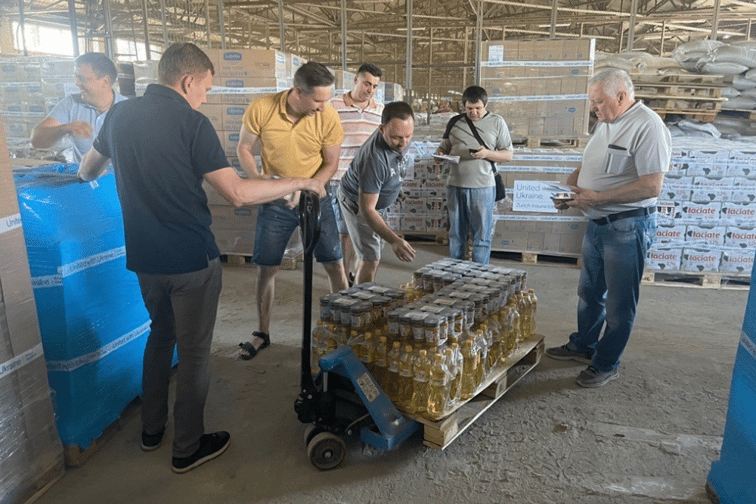

Image credit: Zurich Insurance Group
Like countless organisations across industry sectors, insurance companies stepped up to help people whose lives have been devastated by the eruption of full-scale war in Ukraine. With nearly 50,000 people killed and 15 million more displaced by the ongoing violence, the humanitarian disaster has sparked a large outpouring of support from corporate entities.
Two insurance companies spoke to Insurance Business about their recent efforts to deliver badly needed supplies and provide financial aid to Ukrainian citizens. Amid these campaigns, they shared insights and lessons on what drives their social responsibility agenda.
For Gaby Polanco-Sorto, head of purpose and sustainability at Gore Mutual Insurance, a Canadian insurer, corporate social responsibility (CSR) programs should come from a place of genuine care and intention.
“Part of the work that we’re doing around purpose is going back to our core mandate of taking care of each other,” she told Insurance Business.
Polanco-Sorto acknowledged there was pressure among organisations to come up with a response to mass global events such as the war in Ukraine. But for Gore Mutual, it was important to pause and think about the right approach.
This eventually led to Gore Mutual joining a 24-hour web-a-thon on June 21 to raise funds for local NGOs in Ukraine. The event, Sustainability4Ukraine, was a global dialogue to take stock of the sustainable development agenda, and featured thought leaders from all over the world.
With widespread globalisation and the reach of social media, conflicts in one part of the world can have ripple effects across borders. Herself a refugee who moved to Canada from El Salvador, Polanco-Sorto said the crisis hit close to many hearts.
“It impacts our employees that either have family back in Ukraine or come from Ukraine. And it’s the same thing with employees that are of Russian descent that do not agree with the war. It does impact their mental health,” shared Polanco-Sorto.
“For us, it wasn't just about supporting a cause that many organisations were supporting and getting money to Ukraine for those in need, but also about extending that support to our employees and colleagues by extending some of the mental health support we have in our organisation,” she continued.
Polanco-Sorto said engaging employees on CSR is also a critical part of its success. “What we've been trying to do intentionally is make sure that our employees know they have a voice on how we should direct our giving, our strategies, and our engagements. It builds ownership across the organisation for these important programs,” she explained.
Insurance companies can do more and keep up momentum with such programs by forging strong links with local communities, rooting CSR efforts in small but practical acts of giving.
“We do have employees from Ukraine that email us and ask for different types of support or give us feedback on what other local organisations are doing for Ukraine. Keeping those doors open is important because this is part of how we can help our employees create the change that they want to see,” Polanco-Sorto said.
“There's a whole lot of things that organisations can do, depending on their size and geographic footprint. But I think just keeping issues on the forefront, continuously thinking about what more we can do, and keeping your communication channels open is important,” she concluded.
Alessio Vinci, group chief communications officer at Zurich Insurance Group, said he had sleepless nights leading up to a humanitarian aid trip for Ukrainian citizens. Responding to a direct appeal in May from a Ukrainian parliamentarian, Zurich sent more than 200 tons of food aid to the city of Kharkiv via Poland.
Vinci, who travelled with the delivery to Poland, told Insurance Business that any number of logistical elements could have failed during the highly secretive mission.
“We had to think about where to source the food and supplies, and determined Poland was the best place. We had enough necessities for 5,000 people to last a month,” he shared.
“As an insurance company, we also thought about the long-term impact of the war on people’s mental health, especially young people who might experience trauma from the conflict,” said Vinci, referring to the Global Coalition for Youth Mental Well-being, which the Z Zurich Foundation launched with UNICEF to support young refugees from Ukraine.
Donations to the joint campaign up to CHF 1 million ($1.05 million) until the end of June would be matched by the Foundation. Zurich Group also announced an additional CHF 1 million to the global appeal.
Vinci said timing was an important factor to consider for organisations. “You can’t always answer every single personal appeal, but you can look at where your resources can be best used,” he added.
“It does not matter whether you are an insurance company, a construction company, or a pharma company. We want to inspire all successful companies to do the same.”
